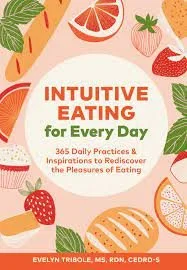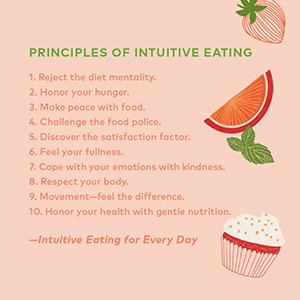What a wonderful and practical resource. I love how the book includes really realistic exercises and thought-provoking questions to help someone deepen their practice of Intuitive Eating. If you're just getting started with Intuitive Eating and feel overwhelmed by the idea of reading the book or completing the workbook I also think this would be a realistic way to lean into the practice of Intuitive Eating. If you're already practicing Intuitive Eating - this is a great tool to stay in the practice and sharpen your skillset and deepen your connection.
Below are some memorable sections from the book:
The 10 Principles:
Reject the Diet Mentality
Honor your Hunger
Make Peace with Food
Challenge the Food Police
Discover the Satisfaction Factor
Feel your Fullness
Cope with your Emotions with Kindness
Respect your Body
Movement - Feel the Difference
Honor your Health with Gentle Nutrition
Day 29: Are you ready to delete Tracking Apps?
Outsourcing your eating decisions to an app or tracker disconnects you from your body, which creates doubt. Apps know nothing about your body’s needs, preferences and hunger.
Day 38: Repairing your Self-Trust
Diet culture undermines self-trust and practically beats it out of us. When you are at war with your body or postponing living you life until your body reaches some goal, you are, in essence, living with conditions on yourself.
Day 56: Creating Breathing Room for a Response
Setting and maintaining boundaries is a learned practice. A good practice is having some automatic responses on hand to give you a buffer, some breathing room. Try one of these:
Let me check my calendar and get back to you.
Let me think about it and get back to you.
Let me check my work schedule and get back to you.
Let me check with my family schedule and get back to you.
Day 59: Intuitive Eating Mantras
My body does not need to earn food through physical activity.
Day 100: Be Kind to Your Mind - Recognizing Activities that Drain You
Mental well-being is an important part of health that is often left out of the conversation. Sometimes you need to take a time-out to refresh your emotional and energetic bandwidth. What types of activities drain your emotional energy?
Scrolling through social media
Conversations with a friend that are not reciprocal
Volunteering for projects that are not aligned with your values or vision
Your own perfectionism
Unrealistic expectations and deadlines
Watching or reading too much news
Day 118: Self-Care for Stressful Times - Your Nonnegotiables
It’s helpful to be clear on your nonnegotiables for enduring challenging times. Consider any of the following:
Getting adequate sleep
Getting consistent nourishment and meeting your energy needs in a timely manner
Moving your body as a way to manage stress
Taking a day off from moving your body, especially when exhausted
Meditating
Seeking social support and connection
Turning down any new projects or responsibilities
Having spiritual support
Day 122: Cultivating Trust - Keeping Food in the Home
When you feel ready (and have the financial privilege), the act of stocking your pantry and refrigerator is healing. It’s a visual reminder of abundance - that you have the food that you need, rejecting the scarcity and fear that diet culture perpetuates. It supports you trusting that you will nourish your body as needed.
Purchasing plenty of previously forbidden foods facilitates the beauty of making peace with foods, which also repairs trust. While it may be impossible to imagine, the foods that used to haunt and call out your name will no longer hold power over you.
Day 129: Loving Boundaries Little Self-Boundaries - Not Automatically Responding
Here are some very simple actions that you can take that will give you breathing room and won’t interrupt your workflow or train of thought: Try not to automatically
Reply to a text, rather respond at your convenience;
Answer your phone, especially when it’s not a good time for you to talk;
Participate in conversations that drain your energy;
Reply to emails, instead prioritizing when and how you will respond.
Day 153: Loving Boundaries Five More Ways to Say No
Thank you for thinking of me, but I’m not available.
Unfortunately, I’m not able to ____________
I’m not comfortable with ____________
I’m not able to add another project.
No, it doesn’t work for me.
Day 198: I am Able to Lean in to Difficult Feelings
While it might not feel this way, emotions are temporary. The more you try to repress an emotion, the longer it will be with you and likely overwhelm you. Allow yourself to be human and lean in to difficult emotions.
Day 203: Letting go of Diet Culture Replacing Appearance-Based Compliments
Here are some nonappearance-based compliments that are more connected to a person’s humanity:
I love your energy.
I admire how you live in alignment with your values.
You seem really happy today.
You are an amazing ____________.
I admire your authenticity.
I feel so comfortable around you.
I feel really heard and safe with you.
I appreciate your open-mindedness and ability to see multiple perspectives.
Day 217: Cultivating Trust Consistent Acts of Self-Kindness Repair Trust
In order for a relationship to flourish, there needs to be a safe bond where both parties can rely on each other. Relationships are mutually interdependent, including the one you have with your body.
Can your body rely on you to treat it well? If your body relationship is fraught with running it into the ground, withholding food, or ignoring the messages that it sends you, then it’s hard to expect a consistent response from your body (such as hunger, fullness and satisfaction). Body chaos disrupts self-connection and trust.
Each time you meet a need of your body, like nourishment, rest, or attuned movement, you are repairing trust, one act of self-kindness at a time. It’s consistency, not perfection, that matters.
Day 234: Loving Boundaries Feeling Guilty for Setting Boundaries
Keep in mind that when you are choosing to set boundaries, you are choosing
Authentic communication over silence, which prevents growing resentment;
To protect your vital limited energy, which prevents burnout and compassion fatigue;
Self-respect, which teaches others how to treat you;
To model healthy communication.
Day 250: Interoceptive Awareness Intellectualization Versus Feeling
It’s easy to get caught up living in your head - like eating according to the rigid rules of a food plan, instead of attuning with your personal appetite and satisfaction. Intellectualization blocks out the experience of feeling emotions by focusing on just the logic and facts of a situation. It’s a common defense mechanism.
The work-around is to get curious and notice. What am I feeling in my body? What am I feeling emotionally?
Day 260: Weekly Intention You Don’t Have to Love your Body
You don’t have to love your body in order to respect it. Body respect comes from the inside out - it’s not about your appearance. It’s an attitude of unconditional positive regard for your humanity, period. Dignity and respect are your birthright as a sentient being.
It’s important to give yourself grace, and be patient with the process of healing your relationship with your body.
I will treat my body with respect by:
Speaking kindly to myself.
Giving myself permission to take a nap or a break.
Allowing myself to leave a toxic conversation about dieting or how bodies should look.
Getting adequate sleep (seven to nine hours per night).
Wearing comfortable shoes.
Taking a relaxing bath.
Not postponing my life until my body changes the way it looks.
Going out with friends.
Day 276: Cultivating Trust The Most Sacred Relationship is with Yourself
Self-trust is an integral component of your most sacred relationship, which is with yourself. In order to connect with others, you need to be able to self-connect, which takes listening and self-trust.
Please know that no matter how long you have been engaged in diet culture, it is possible to heal. You can come home to yourself, your wants, and your needs. Nobody could possibly know what those are, except for you. it’s time to tend and befriend your body. It is never too late.
Day 289: Letting Go of Diet Culture Leaving Diet Culture is like Leaving an Abusive Relationship
The true culprit is our insidious diet culture that demonizes eating certain foods and normalizes body shame. Diet culture disconnects you from your body, your needs and your life. You are not the problem. Your body is not the problem. Diet culture is the problem and the abuser.
Day 296: Embodied Affirmations I am not responsible for Other People’s Feelings
While you are certainly responsible for your words and actions toward others, you are not responsible for the feelings of other people. You cannot control people’s reactions to your decisions; whether they deal with them rationally or not, understandingly or not, is up to them. If you make decisions based on the expected responses of other people, you are not living authentically, which can create a sense of unbalanced living.
Day 331 Self-Care Evaluating whether to take on a new Project or Responsibility
It’s all too easy to jump into projects and opportunities when it’s something you really want to do. The key is to evaluate the possible consequences of saying yes. Here are some clarifying questions to help you assess impact:
Is this opportunity aligned with my values and vision?
Is it aligned with one of my needs - such as experiential, financial, or educational?
Will this renew me, drain me, or have a neutral impact on my emotional energy?
Do I have the time and energy? If not, is there another obligation I am willing (and able) to let go of in order t o fully participate?
Sometimes the kind action, for both yourself and the other party, is to turn down the opportunity, especially if you really don’t have the time to give it the attention it needs to be effective.
Day 342: Body Appreciation You Don’t Owe Anyone a Smaller Body
If you have a partner who pressures you to be a different size or to lose weight, that is not love. It’s objectification. Our bodies change - they are supposed to. We are dynamic, living, ever-evolving beings. Healthy relationships are founded on love, mutual respect, and autonomy.
Having a partner who values your character and humanity, rather than valuing you for just your body, is critical for your mental health. People of all shapes and sizes find healthy, fulfilling love. You deserve this too, if it’s something you desire.
Day 351: Weekly Intention Dealing with Veggie Distress
When you’ve been steeped in diet culture, it’s common to feel conflicted about eating veggies. Consider the following situations. Perhaps you feel
Veggie averse - it’s easy to develop a dislike of eating vegetables when you associate them with dieting and restrictive food plans.
Fear that eating veggies will trigger dieting - It’s common for intuitive eaters to be reluctant to eat vegetables because they fear they will be headed down the rabbit hole of diet culture.
Guilty for not eating enough - Sometimes people feel guilty if they aren’t hitting a daily veggie quota.
This practice is about shifting the focus to the enjoyment of eating veggies in a variety of forms, flavors, and textures. Nothing kills the joy of eating like a serving of guilt. Please remember, it’s important to consider your pattern of eating over a few days or weeks, rather than just one day.
This week: Notice how you feel during and after you eat veggies as a meal, a side dish, or garnish. Explore flavorful ways to include vegetables to your meals - perhaps explore new seasonings and spices, add nuts, or use a dipping sauce.

